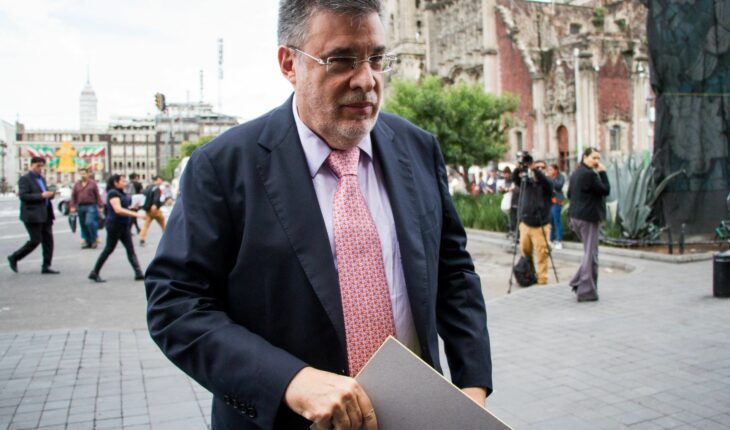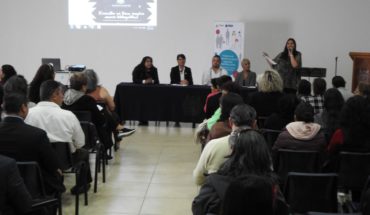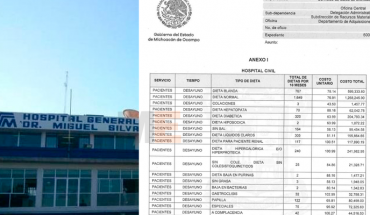As legal advisor to President Andrés Manuel López Obrador, Julio Scherer Ibarra took advantage of his legal powers and influences in the federal government. to stop an investigation which concluded that the concession of the Bicentennial Viaduct was illegal, which the government of the State of Mexico, in the management of Enrique Peña Nieto, granted to the Spanish construction company OHL, today Aleática.
Through acts of authority that are now investigated by the Attorney General’s Office (FGR), Scherer and a group of officials appointed by him validated the concession by which, until now, Aleática S.A.B. de C.V. – represented, in turn, by private lawyers close to the former counselor – has obtained income of at least 6 thousand 934 million pesos derived from the collection of tolls on the Bicentennial Viaduct, profits that will necessarily go up, since the concession is valid, at least, until 2038.
Scherer told Political Animal What had no involvement in the alleged crimes of corruption investigated by the FGR, and referred the responsibility to the Secretariat of Communications and Transportation (SCT).
After an investigation of several months, in March 2020, both the SCT and the FGR had concluded that the award of that route was illegal, due to a state government has no legal powers to grant concessions on general communication routes, such as the Mexico-Querétaro highway, where the Bicentennial Viaduct was built.
However, in September of that same year, Scherer, based in an agreement that allowed him to appoint the holders of the legal units of the entire federal government and that he himself signed, appointed as legal director of the SCT a lawyer close to him, Román García Álvarez, who fifteen days after assuming office, elaborated an agreement that not only declared the concession legal in favor of Aleática, but also opened the door to the possibility of extending it even longer.
That agreement, signed on October 1, annulled a sanction process that the SCT itself had initiated for the irregularity of the concession, and in addition, caused the freezing of an investigation folder that the Prosecutor’s Office already had ready against former officials and that would bring as a direct consequence that the federal government annulled the concession and regained control of the road with everything and the infrastructure of the Bicentennial Viaduct, without having to compensate Aleática.
To make you understand better: FGR goes against 4 lawyers close to Julio Scherer, accuses them of money laundering and extortion
Now, the FGR has opened a new investigation folder in which the former presidential adviser is directly targeted. as likely responsible for corruption crimes to benefit Aleática, its controlling shareholders IFM Investors Pty Ltd and IFM Global Infrastructure Fund, and Viaducto Bicentenario S.A. de C.V., the subsidiary to which the concession was awarded.
Together with Scherer, the FGR investigates two other former collaborators appointed by him in the Legal Department of the Federal Executive (CJEF): Raúl Mauricio Segovia Barrios, who was head of the Deputy Ministry of Constitutional Control and Litigation – a position he left after the resignation of Scherer Ibarra in August 2021 – and Mario Iván Verguer Cazadero, who continues as general director of Constitutional Control in that Deputy Ministry. Both engaged with Scherer through private law firms before entering public service.
The FGR also investigates the current head of the Legal Affairs Unit of the SCT, Román García Álvarez, who was appointed by Scherer on September 16, 2020 and who elaborated the agreement that, two weeks after his appointment, validated the concession of the Bicentennial Viaduct.
The Prosecutor’s Office is investigating Scherer Ibarra, Segovia Barrios, Verguer Cazadero and García Álvarez for the alleged crimes of criminal association; unlawful exercise of public service; unlawful use of powers and powers; influence peddling; abusive exercise of functions; collusion of public servants, and against the administration of justice.
The FGR also investigates a possible conflict of interest in the case, since Scherer’s relatives are part of law firms that work for Aleática. Links of which Political Animal will give more details in a second installment of this report.
The investigation folder was initiated following a complaint filed by lawyer Paulo Díez Gargari, and was turned over to the Specialized Prosecutor’s Office in Matters of Organized Crime (FEMDO) and the Specialized Prosecutor’s Office for Competition Control, formerly the Deputy Attorney General’s Office Specialized in Investigation of Federal Crimes.
This is the first criminal investigation that directly involves López Obrador’s former legal adviser for possible acts of corruption.
“If Aleática today continues to exploit the Bicentennial Viaduct, without a concession from the federal government, he owes it only to one person, which is Julio Scherer“Díez Gargari said in an interview.
Read also: From Cruz Azul to Gómez Mont: the cases under suspicion for alleged links between Scherer and lawyers
“I did not commit any crime”
Questioned about these facts by Political Animal, the former legal adviser confirmed that did appoint García Álvarez and that it was that official who drew up the agreement that validated the concession of the Bicentennial Viaduct.
He said that, although it was his power to appoint the heads of the Legal Affairs Units of all federal agencies, this was at the proposal of the heads of each Secretariat based on a profile established by the Ministry.
“Each of the Heads of the dependencies of the Federal Executive proposed me to the Head of Legal Affairs under a profile established by my area, it was validated and referred to the Head of the Unit to give way to his appointment,” he said in a written response.
Scherer also assured that the SCT agreement that validated the concession of the Bicentennial Viaduct was still elaborated under the management of Javier Jiménez Espriú and its then legal director, Carlos Sánchez Valencia, but admitted that it was finally validated by the new lawyer that he appointed directly in the dependency, that is, García Álvarez.
In this regard: AMLO confirms the resignation of Julio Scherer to legal counsel; estela Ríos González will replace him
He assured that the Legal Counsel of the Presidency did not participate in any type of review of said document, despite the fact that in the explanatory statement of the reform to the Organic Law of the Federal Public Administration of 2018 it was established that the holders of the Legal Affairs Units of the dependencies must have coordination with the head of the Legal Department of the Federal Executive, so it was Scherer’s power to know about the SCT agreement that the FGR is now investigating.
“This agreement was not validated by the area under my charge, therefore I could not commit any crime or have any interference in said matter,” said the former counselor.
On his relationship with García Álvarez and Veguer Cazadero, both investigated by the Prosecutor’s Office, he said that his link with them it wasn’t direct, but through the deputy directors.
Free way to OHL from the Presidency
The irregular concession that the Peña Nieto government granted in 2008 to OHL for the construction and operation of the Bicentennial Viaduct was already in the sights of authorities in the current Obradorist administration.
However, these inquiries were stopped from the Legal Department of the Presidency headed by Scherer through acts of authority, according to ministerial inquiries.
Between 2019 and 2020, both the SCT and the FGR initiated procedures to sanction Mexican government officials for having granted a private company a concession on a federal road – the Mexico-Querétaro highway – which violates, at least, four federal laws and regulations.
On March 6, 2020, the SCT, under the command of Javier Jiménez Espriú, initiated a sanction procedure against the government of the State of Mexico for possible violations of the laws of Roads, Bridges and Federal Motor Transport; of National Assets, and of General Roads of Communication, as well as the regulations for the Use of the Right of Way of the Federal Highways.
All these laws and regulations establish that it is exclusive power of the federal government, and not of the states, to grant concessions on the general channels of communication.
The person responsible for initiating the sanction procedure was Carlos Francisco Sánchez Valencia, who was head of the Legal Affairs Unit of the SCT with Jiménes Espriú.
On August 26, 2020, the government of the State of Mexico responded to the SCT that the sanction process had no justification because, in 1983, the Federation “delivered” to the state government the Toreo-Tepalcapa section of the Mexico-Querétaro highway, which “implied the assumption by the State of Mexico of powers that corresponded to the Federation, (…) and that he delivers it withit establishes a legal and indeed broader power than would derive from a concession.”
Context: Treasury Intelligence Unit investigates former head of the SCT, Gerardo Ruiz Esparza
In reality, what was granted to the Mexican government was the Ceylán-Vallejo branch, and not the entire Toreo-Tepalcapa section, according to the delivery certificate, which is part of the FGR file.
Despite this, surprisingly, on October 1, the SCT itself withdrew from its sanctioning process. And even more: it drafted a new agreement in which, denying its own previous allegations, it recognized the validity and legality of the concession title granted by the Mexican Government in 2008 to OHL for the construction and operation of the Bicentennial Viaduct.
The agreement that validated the Bicentennial Viaduct from the SCT froze an investigation folder that the FGR had initiated since 2019 for alleged acts of corruption in the concession to Aleática.
During six months of investigations, the FGR gathered, among other evidence, the offices in which the SCT denied that there was any concession that validated the exploitation of a federal road by a private company.
In April 2020, Political Animal published that the FGR had initially confirmed that crimes had been committed and that the case would be sent to a judge to proceed criminally against the officials found responsible. In addition, the Prosecutor’s Office sought to withdraw the illegal concession to Aleática, without compensation, in accordance with the General Law of National Assets.
At that time, the FGR was only waiting for the resolution of the SCT sanction procedure to integrate it into the folder. However, the outbreak of the health pandemic stopped both the administrative and criminal procedures for months.
Ministerial authorities confirmed that the sudden agreement that validated the irregular concession to Aleática left without matter the possible commission of a crime of public servants, so the case could not be sent before a judge.
Although the folder was not closed, the investigations were paralyzed for more than a year until, in October of last year, the file was attracted by the prosecutor’s office headed by Juan Ramos, after it began to document the existence of a possible influence peddling around this and other cases.
Responding to requests for information to the Legal Director
In July 2020, Javier Jiménez Espriú left the SCT. In his place was appointed Jorge Arganis Díaz, who kept in his position the legal director who had accompanied Jiménez Espriú, Carlos Sánchez Valencia.
On September 10, Arganis became seriously ill with COVID-19 and was hospitalized. In the absence of the head of the SCT, there was a replacement in the Legal Affairs Unit: Sánchez Valencia submitted his resignation on September 15, and immediately, the next day, Scherer appointed in that position to Roman Garcia Alvarez.
Days before making the leap to a top-level position, García Álvarez was deputy director of Transparencia de Caminos y Puentes Federales (Capufe), a decentralized agency of the SCT, and his function was to respond to requests for information.
Hence suddenly, he became legal counsel of the only federal agency empowered to grant concessions for the operation of general communication routes.
His link with Scherer dates back to the Secretariat of Urban Development and Housing (Seduvi) of the CDMX, during the government of Miguel Ángel Mancera, according to the file.
See also: FGR confirms illegal concession to OHL with Peña Nieto; criminal charges enlisted
García Álvarez was director of Regulations at Seduvi and, between 2014 and 2015, he was under the orders of Mario Iván Verguer Cazadero, who was head of the Legal Affairs Directorate of that capital agency.
Verguer Cazadero was a friend of Scherer. In November 2018, shortly before the obradorista government’s inauguration, the former legal head of Seduvi presented a book at the National Institute of Criminal Sciences (Inacipe). Scherer Ibarra was its co-presenter.
Days later, upon assuming the ownership of the Legal Department, Scherer appointed Verguer Cazadero as general director of Constitutional Control; as head of this he appointed Raúl Mario Segovia Barrios, partner of a firm with which Scherer has family ties.
The three officials had the power to draft the Dec. 14, 2018, agreement that allowed Scherer to appoint the heads of the legal affairs units of all federal agencies. Based on that agreement, in September 2020, Román García Álvarez, a former subordinate of Verguer Cazadero, was placed in the SCT, position from which an inquiry into the concession of the Bicentennial Viaduct to Aleática was stopped.
A network of blackmail and corruption
In the investigation file of the FGR initiated from the complaint filed by Paulo Díez, it is established that Julio Scherer headed an alleged network of public servants and private lawyers who operated to favor Aleática. This in order to obtain illegal economic benefits to the detriment of millionaire losses for the State.
“Some of the members of this network such as Raúl Mauricio Segovia Barrios, Mario Iván Verguer Cazadero and Román García Álvarez were appointed by Scherer Ibarra to occupy important positions in the public administration, from which they could unduly influence matters of maximum national interest in favor of one or more individuals,” the file indicates.
The alleged criminal scheme investigated by the FGR was composed of two parts. On the one hand, the aforementioned officials who acted to favor the company, in this case Aleática, with acts of authority that allowed it to continue exploiting concessions such as the Bicentennial Viaduct.
On the other hand, the law firms and financial advisors hired by the company Aleática itself, but close to Scherer, which received the economic benefits for the efforts in which the company was favored. Among them are Juan Antonio Araujo Rivapalacio; Alonso Rivera Gaxiola, Rodrigo Lagos Scherer and Pedro Scherer Ibarra (the latter two relatives of the former legal adviser to the presidency).
“These people were hired by the private beneficiaries of the acts or omissions of Julio Scherer Ibarra himself and a group of public servants hired by him, and would charge millionaire sums of money for fees (not all invoiced) to individuals,” the investigation folder details.
In the complaint that Díez filed, it is established that the hiring of the lawyers and advisers who participate in this possible corruption network was made at the suggestion of the former legal advisor.
Beyond the particular benefits obtained by Aleática and those involved in the network, the complaint indicates that the greatest detriment is for the State, since that company is still allowed to charge a fee for driving on a highway whose concession does not belong to it. Only between June 2009 and June 2020, according to what was established in the investigation, Aleática would have charged 6 thousand 934 million pesos for tolls on said viaduct.
Political Animal verified that there are public records that confirm the relationship of the aforementioned offices with Aléatica. For example, in August 2020, the lawyer Alonso Rivera Gaxiola himself confirmed that, on behalf of IFM Investors (majority shareholder of Aleática), he had promoted a lawsuit against Paulo Díez, as read in the note reproduced on the website of his firm. Juan Araujo, for his part, declared last year that he could not comment on the Bicentennial Viaduct, since by “professional secrecy” he was obliged not to reveal details of his cases.
On the relationship with these offices, Julio Scherer told Animal Político that in the past he was a partner in Rivera Gaxiola’s office, but said that currently said company is already dissolved.
What we do at Animal Político requires professional journalists, teamwork, dialogue with readers and something very important: independence. You can help us keep going. Be part of the team.
Subscribe to Animal Político, receive benefits and support free journalism.#YoSoyAnimal





